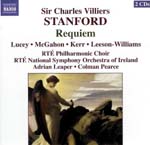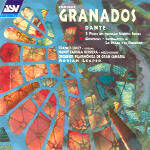

Originally released on Marco Polo, these fine performances make a welcome return on Naxos. In Memoriam and Festal Dance are early Brian: tuneful, somewhat heavily

The best parts of this late-Romantic setting of the Requiem are the quieter ones. Whether by design or because constrained by Victorian-era Church of England

Adrian Leaper’s light, fresh-sounding Mahler Symphony No. 1 emphasizes the music’s bucolic nature and evokes the youthful Mahler of the Wunderhorn songs. Indeed, this gentle

Are there any bad recordings of the Concierto de Aranjuez? This certainly isn’t one. Luis Orlandini plays very enthusiastically, with a focused tone and plenty

Adrian Leaper proves a sensitive and refined Ravel conductor, attuned to the music’s luminous colors and rhythmic nuances. This makes the more exotic passages of

This is a pretty droopy selection of Falla favorites. El amor brujo isn’t done complete: with no singer on hand Adrian Leaper either leaves the

You might think that these performances can’t possibly compete with the more illustrious versions by various Czech conductors and orchestras, but you would be wrong.

Anyone who loves Spanish music will tell you that it’s a constant source of frustration that there aren’t more orchestral scores by the great 19th

Spanish composer Conrado del Campo (1878-1953) composed a large amount of attractive orchestral music, but because he belonged to the Strauss/Wagner school rather than the

Some composer’s shouldn’t do hell. Berlioz? Now he did hell! Liszt? He couldn’t do anything but hell; his heaven was insipid. But Granados? Forget it.
![]()
